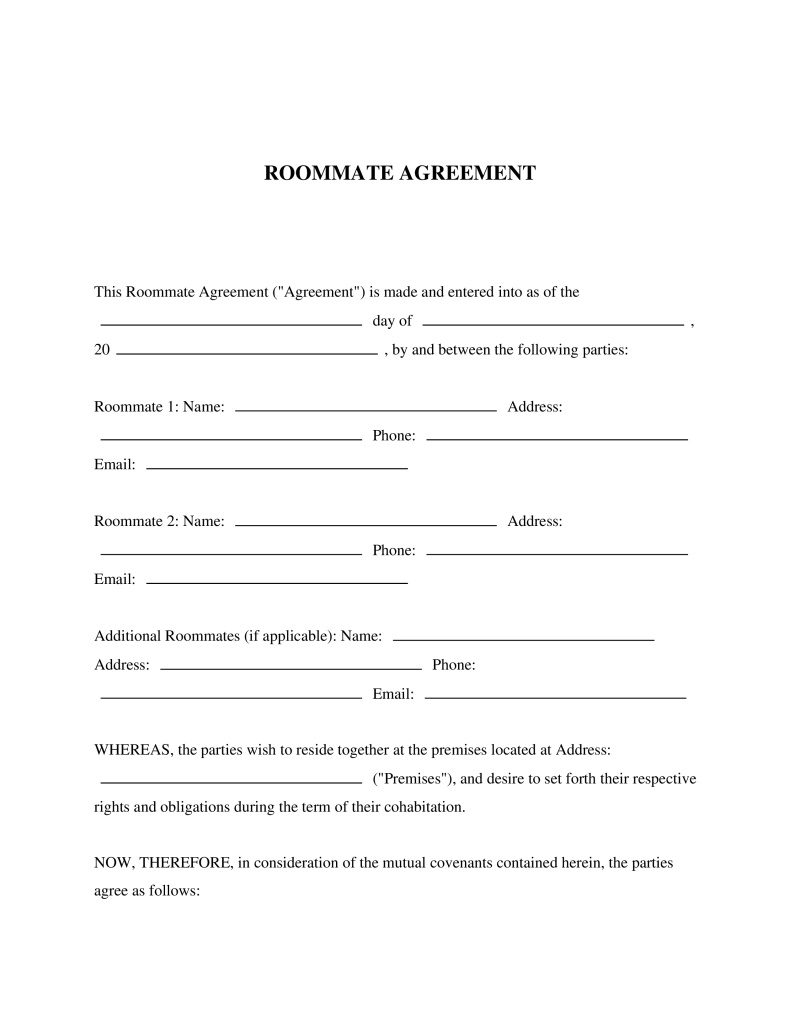A Roommate Agreement is a document outlining the rights and responsibilities of roommates, including rent, utilities, and shared spaces.
Full Name
Write your complete name as it appears on your legal documents, including your first name, middle name (if you have one), and last name. For example, if your name is John Michael Smith, write "John Michael Smith." This information is important because it identifies you in the legal process.

Table of Contents
What is a Roommate Agreement?
A Roommate Agreement is a legal document that outlines the duties, responsibilities, and expectations of individuals sharing a living space. Unlike a lease agreement with a landlord, this contract is among the roommates themselves, setting clear guidelines for rent payment, utility sharing, house rules, and other shared responsibilities. This document becomes particularly vital for individuals looking to establish a harmonious living situation by preempting potential disputes and ensuring that each party's rights and obligations are clearly defined. It is essential for anyone sharing their living space with others, whether in a college dormitory or a shared apartment or house, as it promotes transparency and mutual respect among all occupants.
Key Features
Important Provisions
- Rent Payment: Details how rent will be divided and paid among roommates.
- Utilities and Other Expenses: Outlines how utilities, groceries, and other shared expenses are split.
- House Rules: Establishes guidelines for noise levels, overnight guests, cleanliness standards, etc.
- Termination: Specifies conditions under which the agreement can be terminated or altered.
Pros and Cons
Pros
- +Reduces potential conflicts by clearly defining rules and responsibilities.
- +Facilitates open communication among roommates from the outset.
- +Serves as a legally binding document that can be referred to in case of disputes.
- +Allows for flexibility to accommodate the specific needs of the roommates involved.
- +Promotes fairness by ensuring that expenses and duties are divided equitably.
Cons
- -May not cover every possible scenario or dispute that could arise.
- -Requires all parties to agree on terms, which can be time-consuming.
- -Might need periodic updates as circumstances among roommates change.
Common Uses
- College students sharing dorm rooms or apartments off-campus.
- Young professionals moving into shared housing to save on living expenses.
- Friends deciding to live together in a rented property.
- Strangers becoming roommates through roommate matching services or classified ads.
- Individuals seeking to split costs of utilities and other household expenses fairly.
Frequently Asked Questions
Do you have a question about a Roommate Agreement?
Example questions:
Not the form you're looking for?
Try our legal document generator to create a custom document
Community Discussion
Share your experience and help others
Legal Notice: Comments are personal opinions and do not constitute legal advice. Always consult a qualified attorney for matters specific to your situation.
Comments (0)
Leave a Comment
No comments yet. Be the first to comment!